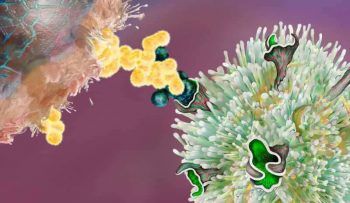Fabio Bergamin in Phys.Org:
 Medicine has great hopes for personalised cancer immunotherapy. The idea is to have a vaccine prompt the immune system to fight a tumour. Scientists at ETH Zurich have developed a method that allows them to determine which molecules are suited to patient-specific immunisation. Cells belonging to the body’s own immune system can help fight tumours. For several years now, this has allowed oncologists to use medications known as checkpoint inhibitors to encourage T cells to eliminate tumour cells. Last year the two scientists who discovered this therapeutic approach were awarded the Nobel Prize for Medicine.
Medicine has great hopes for personalised cancer immunotherapy. The idea is to have a vaccine prompt the immune system to fight a tumour. Scientists at ETH Zurich have developed a method that allows them to determine which molecules are suited to patient-specific immunisation. Cells belonging to the body’s own immune system can help fight tumours. For several years now, this has allowed oncologists to use medications known as checkpoint inhibitors to encourage T cells to eliminate tumour cells. Last year the two scientists who discovered this therapeutic approach were awarded the Nobel Prize for Medicine.
While doctors are enjoying some initial successes with this method, especially with regard to melanomas and several other types of cancer, immunologists and cancer researchers are working to develop the approach further. What they have in mind is a vaccine that would cause cancer-repelling T cells to multiply in the body, thereby strengthening the body’s immune defences. The big question is which molecules are suitable for a vaccine? Researchers working in the team of Manfred Kopf, Professor of Molecular Biomedicine, have now developed a method for identifying such molecules. Since on the one hand tumours differ greatly from patient to patient, and on the other no two people (except identical twins) have the same immune system, future immunisation against cancer is a complex example of personalised medicine. The goal is to develop an individual vaccine for each patient.
More here.
